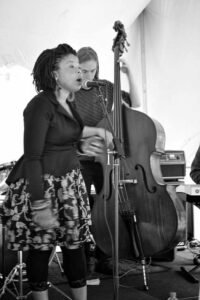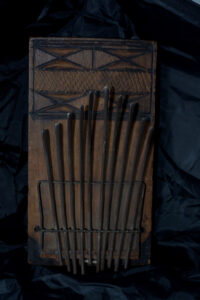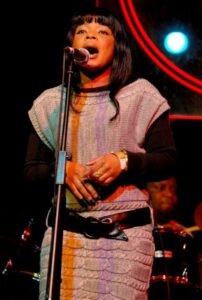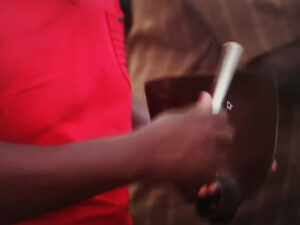By Emmanuela Yogolelo
Before I share the Afro-Raga music Jaydev and I have created, here are some details on African musical traditions and traditional African music.


 About African music being participative.
About African music being participative.
Traditionally in Africa, anyone (who wants) can join in music during a performance, whether musician or not. Notice how in a party or a concert, Africans grab anything around them including forks, glasses or plates and start playing. Others simply dance, make some ululations or sing parts of the songs that are being performed as responses to calls or choruses.
Although music is participative in Africa, in some parts of the continent, certain types of music are performed by specific categories of people only; for example men or adults. In other parts of Africa, everybody can sing but only women can do the ululation.
In terms of instruments and instrumentals, percussions dominate and, above all instruments, drums rule.
Whilst djembe is the Western African drum, in Central-African music we have other types of drums.
The predominance of drums in African music is such as some non-percussive instruments are played as if they were percussion, for example the Congolese Bass.
Percussion includes body percussion such as hand clapping and foot stamping. Some percussive instruments are worn as fashion accessories.



Some African vocals are said to be polyphonic and instrumentals are polyrhythmic, however for Africans these are just ensembles.
Most of the time singing, in Africa, involves calls and responses.
An African musician once beautifully summed up African singing for me in his own words. He told me that, just like in football, in African music the singers are the attackers and the instrumentalists are the defenders. In fact, traditional African singing is driven and rarely laid back.
Another African musician told me that the strongest beat, also called ‘the on the floor beat’, drives dance in African music. I since have confirmed what both these musicians told me.
Until next time when I will upload the last post on ‘when African and Indian musical traditions meet’, enjoy a polyphonic singing in the link below.
To stay updated on this project and other projects I will be doing in the future, keep visiting this blog.
I will be uploading, on here, more posts; songs I write; performances I do and general topics related to my practice.
I will soon be able to offer my normal services and new bespoke ones online. Fees are based on Musicians Union rates.
Services I currently am offering arefrican singing workshops
African singing workshops
A training in using African musical traditions as technique to create interactive pieces and performances
Improvisation sessions with me around singing, song writing and African polyphonic singing/harmonies
For more information on these services or inquiries, send an email via the contact page. sremmanuela@googlemail.com or call on 07868591070
Until next time, please kindly subscribe for this blog (AT THE BOTTOM OF HOME PAGE);follow me on Twitter (Emmanuela Yogolelo or @emmayogol1); like; share; spread the word and leave constructive comments.
Thank you.
